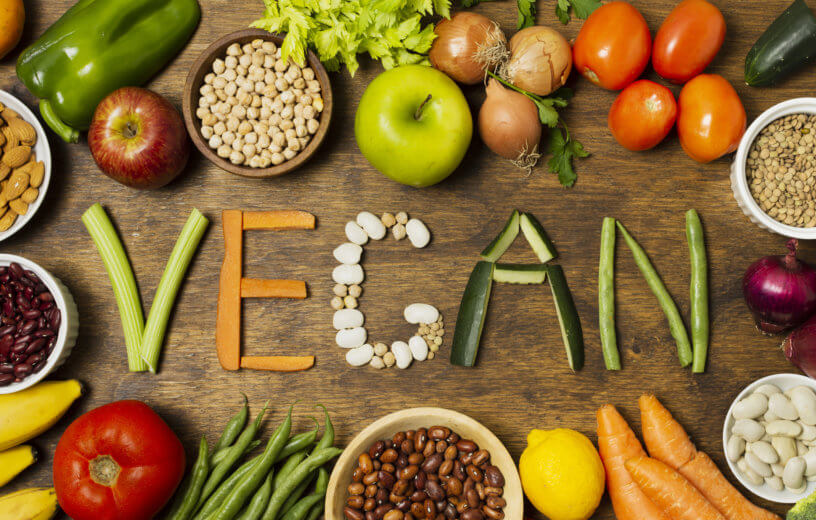An increasing number of people are choosing to reduce or eliminate animal products from their diet. As a result, a wider selection of plant-based options in grocery stores, restaurants, public events, and fast food chains has been noticed.
Some people choose to label themselves "plant-based", while others use the term "vegan" to describe their lifestyle. As such, you may wonder what the differences are between these two terms.
In this article we will differentiate between these two terms when it comes to diet and lifestyle.

The term "vegan" was created in 1944 by Donald Watson, an English animal rights advocate and founder of The Vegan Society, to describe a person who avoids the use of animals for ethical reasons. Veganism refers to the practice of being vegan.
Veganism expanded to include a diet that excluded foods of animal origin, such as eggs, meat, fish, poultry, cheese, and other dairy products. Instead, a vegan diet includes plant foods such as fruits, vegetables, grains, nuts, seeds, and legumes.
Over time, veganism evolved into a movement based not only on ethics and animal welfare, but also on environmental and health concerns, which have been validated by research.
People have become more aware of the negative effects of modern animal agriculture on the planet, as well as the potential negative health effects of eating a diet rich in processed meat and choosing saturated fat over unsaturated fat.
In the 1980s, Dr. T. Colin Campbell introduced the term "plant-based diet" to the world of nutritional science to define a low-fat, high-fiber, plant-based diet that focuses on health and not ethics. Today, in data collected from surveys that indicate that approximately 2% of Americans consider themselves vegan, most of whom belong to the Millennial generation.
Also, many people don't label themselves vegetarian or vegan, but are interested in reducing their consumption of animals and trying foods that are popular on a vegan or plant-based diet.
Although various definitions are circulating, most people agree on some specific differences between the terms "vegetarian" and "vegan."
Many people use the term "plant-based" to indicate that they eat a diet that comprises entirely or primarily plant foods. However, some people may call themselves "Plant-Based" and still eat certain animal products.
Others use the term "whole, plant-based foods" to describe their diet as primarily made up of whole plant foods that are raw or minimally processed.
Someone on a plant-based, whole-food diet will also avoid processed oils and grains, while these foods can be consumed on a vegan or plant-based diet.
The “whole foods” part is an important distinction, as there are many processed vegan foods. For example, certain varieties of mac and cheese, crackers, cheese slices, bacon, and even “chicken” nuggets that are vegan, but would not be on a plant-based whole food diet.

Being vegan goes beyond diet and also describes the lifestyle one chooses to lead on a daily basis. Veganism is generally defined as living in a way in which you avoid consuming, using or exploiting animals as much as realistically possible. While this leaves room for individual preferences and barriers, the overall intention is that minimal harm is done to animals through life choices.
In addition to excluding animal products from their diets, people who label themselves vegan generally avoid buying items that were made or tested on animals as well.
This often includes clothing, personal care products, shoes, accessories, and household items. For some vegans, this may also mean avoiding medications or immunizations that use animal by-products or that have been tested on animals.
Many people are choosing lately to reduce or eliminate the amount of animal products they consume. While some people choose not to label their dietary choices, others consider themselves vegan and others "plant-based."
Many people may start out vegan, avoiding animal products in their diet primarily out of ethical grounds or an environmental concern to reduce their carbon footprint, but then adopt a whole food, plant-based diet to achieve their health goals.
On the other hand, some people may start eating whole foods, a plant-based diet, and then decide to expand towards veganism by aligning themselves with the rest of their lifestyle, avoiding animal products in other non-food areas as well.
The term "vegan" extends to a person's lifestyle choices beyond diet. A vegan lifestyle aims to avoid causing harm to animals in any way, even through used or purchased products. Someone who is vegan also tends to be aware of the potential negative environmental effects of animal products.
While these two terms are fundamentally different, they share similarities. Additionally, both lifestyles are gaining popularity and can be healthy ways of eating if planned properly.
To read more tips that will help you be healthier and feel better, don't forget to browse our Birdman Blog!
Comments will be approved before showing up.

Natalia Urdiales
Author